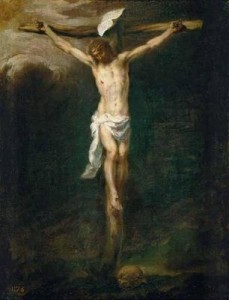
Evangelical Essentials (Part Two)
The Cross is the great act of Jesus in dying for our sins, being buried in the tomb and rising from the dead, baptizing with the Holy Spirit, and ascending to the Father. All grace flows from the Cross as its source and all grace leads back to the Cross as its crown and triumph. The Cross of Christ is our victory, our repentance, our hope, and our call. The Cross was not a defeat, but the astonishing victory of God over the world, the flesh, sin, death, and the devil.
We are not to regard the Cross as defeat and the resurrection as victory. rather, the Cross was the victory won, and the resurrection the victory endorsed, proclaimed, and demonstrated.
[John Stott, The Cross of Christ (Downers Grove, IL: InterVarsity, 1986), 235.]
A number of metaphors are used in scripture to describe the finished work of Christ on the Cross: victory over the oppression and enslavement of sin (1 Cor. 15:57), justification that satisfies the penalty of sin (Rom. 4:25), adoption which grants us the legal status of a son of God and an heir of the kingdom (Rom. 8:17, 23), reconciliation which restores our broken relationship with God (2 Cor. 5:19), forgiveness of our offenses as a result of his pain and suffering on Calvary, redemption and ransom paid to free us from the captivity of sin (1 Cor. 6:19), healing from brokenness created by our sin (Isa. 53:5), representative bringing us all the privileges of the new covenant (Rom. 5:17), participation in all the benefits of his death, burial, and resurrection (Rom. 6:1-4), and substitution for he took upon himself our punishment, guilt, and shame (Rom. 4:25). “How marvelous the power of the cross; how great beyond all telling the glory of the passion: here is the judgment-seat of the Lord, the condemnation of the world, the supremacy of Christ crucified (Leo the Great).â€
[St. Leo the Great, Sermon LIX (On the Passion, VIII. on Wednesday in Holy Week.)]
The work of the Cross is not just about our immediate justification, but also the triumph of the Cross is our calling, our sanctification, and our glorification (1 Cor. 1:30, Rom. 8:29-30). As Jerry Bridges notes:
So I learned that Christians need to hear the gospel all of their lives because it is the gospel that continues to remind us that our day-to-day acceptance with the Father is not based on what we do for God but upon what Christ did for us in his sinless life and sin-bearing death. I began to see that we stand before God today as righteous as we ever will be, even in heaven, because he has clothed us with the righteousness of his Son. Therefore, I don’t have to perform to be accepted by God. Now I am free to obey him and serve him because I am already accepted in Christ (see Rom. 8:1). My driving motivation now is not guilt but gratitude.
[Jerry Bridges, “Gospel-Driven Sanctification†Modern Reformation Magazine (May/June, Vol. 12, No. 3, 2003), 13-16.]
Everything that the Son of God did and taught for the reconciliation of the world, we know not only as an historical account of things now past, but we also experience them in the power of the works that are present.
[Leo the Great, Sermon LXIII:VI: 3 (On the Passion, XII. preached on Wednesday of Holy Week)]
For the Evangelical, the Cross is not just an event in the historical past or an event in their personal past, but the Cross is a daily comfort that brings grace in failure, freedom from performance pressure, intimacy with God, and power for serving their Lord.





